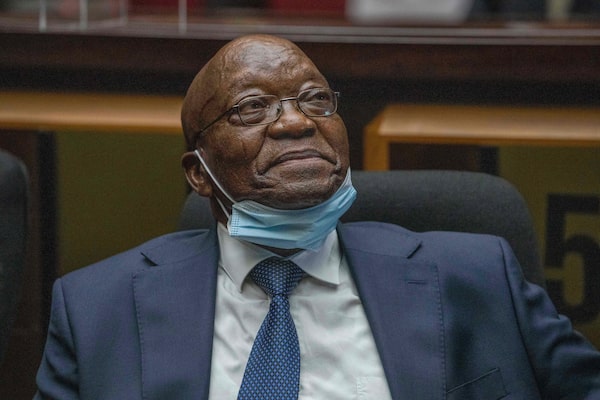
Former South African president Jacob Zuma sits in the High Court in Pietermaritzburg, South Africa, on Jan. 31, 2022. He reported back to jail on Aug. 11, only to be quickly released.JEROME DELAY/AFP/Getty Images
Less than 90 minutes after returning to jail for contempt of court, former South African president Jacob Zuma has been granted freedom under a newly announced government program to reduce overcrowding in prisons.
The 81-year-old politician was one of about 9,500 non-violent inmates who were authorized to leave South Africa’s prisons Friday under a remission scheme approved by his successor, President Cyril Ramaphosa. He had arrived at a prison in KwaZulu-Natal province at about 6 a.m., was swiftly processed and freed just over an hour later.
Opposition politicians said his speedy release was far from coincidental. They said it was obvious that the ruling party, the African National Congress (ANC), was using the prison overcrowding issue to help one of its most powerful members evade justice.
Mr. Zuma was imprisoned in 2021 for violating a court order to testify at a state inquiry into corruption but was given medical parole after serving just two months of the 15-month sentence. South African courts later ruled that his release was illegal and ordered his return to prison.
South Africa’s prisons, which hold more than 212,000 inmates, are operating at 143 per cent of their capacity, according to the Correctional Services department in its announcement of the remission plan. “This poses a direct threat to inmate health, security and management, and it could lead to a surge in gangsterism,” the department said.
The largest opposition party, the Democratic Alliance (DA), denounced the Zuma decision as an outrageous attack on the rule of law. “This is a monumental insult,” said Glynnis Breytenbach, a former prosecutor who is now the DA justice critic.
“This elaborate scheme, devised only to let a single man out of prison, means that over 9,400 convicted criminals will be let out of prison – simply to avoid the reincarceration of Mr. Zuma,” she said in a statement. “Accountability for senior ANC leaders is nothing but a mirage.”
The DA said it is seeking legal avenues to challenge the government’s decision. But constitutional experts said a challenge is unlikely to succeed because South African law gives the president wide discretion in remitting jail sentences.
Mr. Zuma was forced to resign as president in 2018, after nine years in office, amid a corruption scandal involving his relationship with an Indian business family. When he later refused to answer questions at a state inquiry into the affair, despite court rulings that he was obligated to testify, he was convicted of contempt of court.
His brief imprisonment in 2021 sparked violent protests by his supporters, leading to larger-scale riots and looting that caused more than 300 deaths and widespread arson and destruction across the country.
Mr. Zuma’s faction of the ANC has continued to oppose Mr. Ramaphosa’s leadership, but the ANC is keen to keep him inside the party in the lead-up to next year’s elections, where it will face a tough battle to retain its majority in parliament.
The Inkatha Freedom Party, an opposition party based largely in Mr. Zuma’s stronghold of KwaZulu Natal, said the former president’s release from prison will help prevent further violent unrest in the province, but it should not be considered a precedent.
“Lawlessness and violence – or the threat of violence – must never outweigh the need for justice, accountability, and consequences for one’s actions,” the party said in a statement Friday.
Some legal experts, however, supported the decision to free Mr. Zuma. “Nothing more could be gained through further incarceration,” said Thuli Madonsela, a former head of an anti-corruption watchdog agency who had led the key investigations into the Zuma corruption case.
“The point regarding no one being above the law has been made, and the teaching power of the law leveraged,” she said in a social media post Friday.
Mr. Zuma has claimed to be suffering from medical ailments but has declined to give any details. He travelled to Russia last month, saying he was receiving treatment there.
In addition to the contempt-of-court conviction, he still faces 16 charges of racketeering, fraud, corruption and money laundering for allegedly accepting bribes for his role in a US$4.8-billion arms purchase by the government in 1999, when he was deputy president.
He has fought those charges for the past 18 years, using a vast arsenal of legal tactics to delay his trial. Critics have described his strategy as his “Stalingrad” defence – a reference to the Second World War battle in which the Soviet army refused to cede even an inch to the invading German forces.
Most recently, he launched a private prosecution of Mr. Ramaphosa, alleging the President had wrongly rejected his request to investigate the prosecutor in his corruption trial. The courts, at Mr. Ramaphosa’s request, issued an order to quash the private prosecution. But the country’s top court, the Constitutional Court, upheld the order Friday.